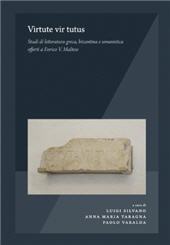"Es bienaventurado varón el que en concilio malicioso no anduvo descuidado" : la Metáfrasis de los Salmos de Apolinario de Laodicea : una aproximación a los modos de reescritura en poesía tardoantigua
P. 643-659
The recent edition of Apollinarios' metaphrasis of the Psalms by Andrew Faulkner (Oxford 2020) provides a solid basis on which to analyze the process of a Christian author of the second half of the 4th century to rewrite the koine texts in a higher level of Greek. Apollinarios was part of a widespread classicizing movement in the Christian literature of his time that produced many works written in the different languages and dialects of Archaic and Classical Greek. Attic was the main model for the prose writers, but Homeric Greek or the language of ancient tragedy also provided patterns of imitation for Christian poetry. This case has to do with a Homeric “metaphrasis” of the Psalms that was intended as a true “translation” from one language to the other, as the author explicitly declares in the hexameters that constitute the protheoría.
The purpose of this paper is to briefly consider the mechanisms of the translation, paying special attention, beyond the morphological changes, to syntactical variations and lexical substitutions, which were occasionally documented in Byzantine grammars and dictionaries. This paper focuses on a couple of Psalms “translated” by Apollinarios. [Publisher's text]
-
Capitoli dello stesso volume (disponibili singolarmente)
-
Informazioni
ISBN: 9789464753127


